The Taiwan People’s Party (TPP) yesterday won five at-large seats to become the third-largest party in the Legislative Yuan, followed by the New Power Party (NPP) with three at-large seats.
The Taiwan Statebuilding Party obtained one regional legislator seat, while independent candidates secured five.
The TPP is a nascent party established in August last year by Taipei Mayor Ko Wen-je (柯文哲), who was elected its founding chairman, and while Ko did not run for president, the party nominated 18 regional legislators and announced a list of 29 legislator-at-large nominees.
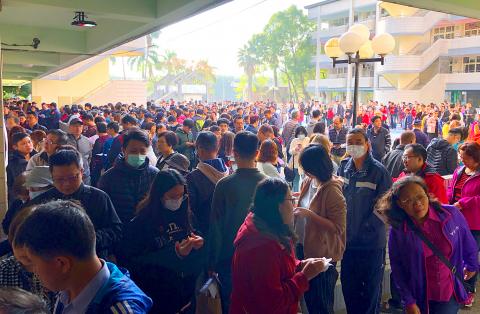
Photo: CNA
The TPP failed to obtain regional legislator seats, but secured the at-large seats by gaining 1,588,806 or 11.2203 percent of the overall political party votes.
Topping the TPP’s list of legislator-at-large candidates was Taipei Department of Labor Commissioner Lai Hsiang-lin (賴香伶), followed by National Sun Yat-sen University College of Social Science dean Jang Chyi-lu (張其祿), Hon Hai Technology Group Industrial Big Data Office vice president Ann Kao (高虹安) and World Taiwanese Chambers of Commerce secretary-general Andy Chiu (邱臣遠).
Ko has said that he hoped that with the founding of the TPP, people would be given another choice besides the Chinese Nationalist Party (KMT) and Democratic Progressive Party, and that the TPP, which favors an open and transparent government, aims to gain enough legislative seats to become a critical minority party that would keep the two major parties in check.
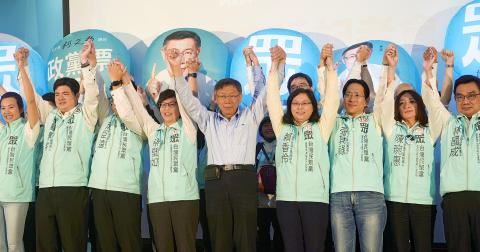
Photo: Chang Chia-ming, Taipei Times
The NPP garnered 7.7549 percent of the party votes, a slight improvement from the 6.1 percent it received in the 2016 elections.
Topping the NPP’s list of at-large nominees is environmentalist Chen Jiau-hua (陳椒華), followed by former NPP chairman and human rights lawyer Chiu Hsien-chih (邱顯智) and Claire Wang (王婉諭), whose four-year-old daughter, nicknamed “Little Lightbulb” (小燈泡), was murdered on a street in Taipei in 2016.
In the 2016 elections, aside from the DPP and KMT, only the NPP and the People First Party (PFP) obtained enough party votes to cross the 5-percentage-point threshold and secure legislator-at-large seats, receiving two and three seats respectively.
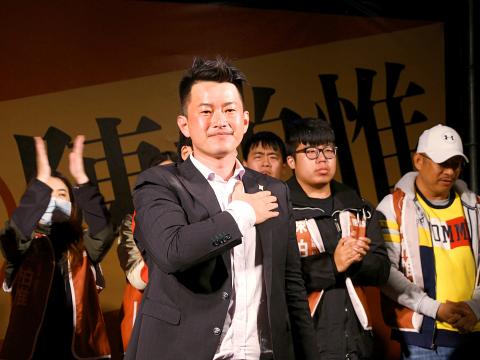
Photo: CNA
The PFP did not receive enough votes this year.
Under the “single-member constituency, two-vote system,” eligible voters can cast two ballots in the legislative elections, one for a regional candidate and the other for a party, and 34 legislator-at-large seats are distributed between the parties according to the proportion of party votes they obtain.
A record high of 19 parties ran in this year’s elections.
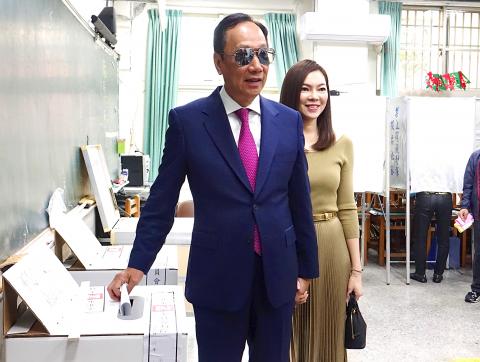
Photo: Wang Yi-sung, Taipei Times
Among the “third-force” parties and independent candidates, the most attention-grabbing legislators-elect are DPP-endorsed Taiwan Statebuilding Party spokesman Wonda Chen (陳柏惟), DPP-endorsed independent Legislator Freddy Lim (林昶佐), independent Legislator Chao Cheng-yu (趙正宇) and independent candidate Fu Kun-chi (傅崐萁).
Wonda Chen won in a traditional KMT stronghold, Taichung’s second electoral district — which includes the Dadu (大肚), Wurih (烏日), Longjing (龍井), Shalu (沙鹿), Wufeng (霧峰) districts and and part of Dali District (大里).
He is the first legislator elected from the Taiwan Statebuilding Party — formerly known as Taiwan Radical Wings — a new party founded in Kaohsiung that is considered to belong to the pro-independence camp.
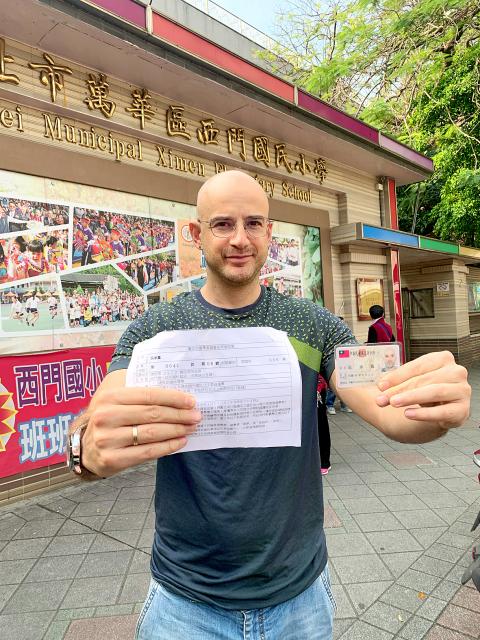
Photo: Hsiao Fang-chi, Taipei Times
Wonda Chen’s defeat of Yen Kuan-heng (顏寬恆) came as a surprise to many, as Yen has been a legislator for two terms after winning a by-election in 2013 to fill the vacant post left by his father, former Non-Partisan Solidarity Union legislator Yen Ching-piao (顏清標), after he was found guilty of corruption.
The Yen family has governed the district for more than a decade.
Lim, the frontman for metal band Chthonic, was re-elected in Taipei’s Zhongzheng-Wanhua (中正-萬華) electoral district by obtaining 81,853 votes, or 44.9137 percent, defeating former KMT legislator Lin Yu-fang (林郁方) a second time.
Lim was first elected in 2016 as an NPP member, but announced in August last year that that he would leave the party to support President Tsai Ing-wen’s (蔡英文) re-election bid.
However, DPP-endorsed independent Legislator Hung Tzu-yung (洪慈庸), another former NPP legislator who left the party in August last year, failed to win re-election in Taichung’s third electoral district.
Fu, a former Hualien county commissioner who was imprisoned for eight months between 2018 and last year for insider trading, won in Hualien County by obtaining 64,060 votes, and is to replace DPP Legislator Hsiao Bi-khim (蕭美琴).
Chao won in Taoyuan’s sixth electoral district, defeating KMT Legislator Apollo Chen (陳學聖).

CHAOS: Iranians took to the streets playing celebratory music after reports of Khamenei’s death on Saturday, while mourners also gathered in Tehran yesterday Iranian Supreme Leader Ayatollah Ali Khamenei was killed in a major attack on Iran launched by Israel and the US, throwing the future of the Islamic republic into doubt and raising the risk of regional instability. Iranian state television and the state-run IRNA news agency announced the 86-year-old’s death early yesterday. US President Donald Trump said it gave Iranians their “greatest chance” to “take back” their country. The announcements came after a joint US and Israeli aerial bombardment that targeted Iranian military and governmental sites. Trump said the “heavy and pinpoint bombing” would continue through the week or as long

TRUST: The KMT said it respected the US’ timing and considerations, and hoped it would continue to honor its commitments to helping Taiwan bolster its defenses and deterrence US President Donald Trump is delaying a multibillion-dollar arms sale to Taiwan to ensure his visit to Beijing is successful, a New York Times report said. The weapons sales package has stalled in the US Department of State, the report said, citing US officials it did not identify. The White House has told agencies not to push forward ahead of Trump’s meeting with Chinese President Xi Jinping (習近平), it said. The two last month held a phone call to discuss trade and geopolitical flashpoints ahead of the summit. Xi raised the Taiwan issue and urged the US to handle arms sales to

State-run CPC Corp, Taiwan (CPC, 台灣中油) yesterday said that it had confirmed on Saturday night with its liquefied natural gas (LNG) and crude oil suppliers that shipments are proceeding as scheduled and that domestic supplies remain unaffected. The CPC yesterday announced the gasoline and diesel prices will rise by NT$0.2 and NT$0.4 per liter, respectively, starting Monday, citing Middle East tensions and blizzards in the eastern United States. CPC also iterated it has been reducing the proportion of crude oil imports from the Middle East and diversifying its supply sources in the past few years in response to geopolitical risks, expanding

Pro-democracy media tycoon Jimmy Lai’s (黎智英) fraud conviction and prison sentence were yesterday overturned by a Hong Kong court, in a surprise legal decision that comes soon after Lai was jailed for 20 years on a separate national security charge. Judges Jeremy Poon (潘兆初), Anthea Pang (彭寶琴) and Derek Pang (彭偉昌) said in the judgement that they allowed the appeal from Lai, and another defendant in the case, to proceed, as a lower court judge had “erred.” “The Court of Appeal gave them leave to appeal against their conviction, allowed their appeals, quashed the convictions and set aside the sentences,” the judges